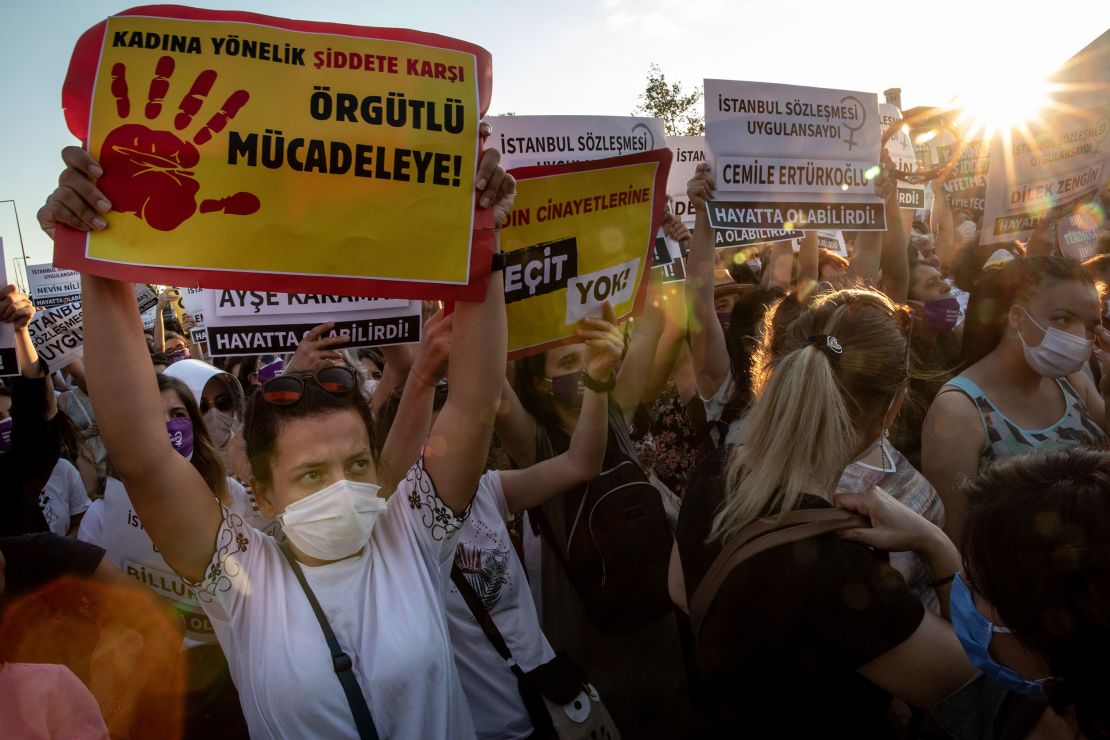Women poured into rallies across Turkey on Wednesday over fears of Ankara’s potential withdrawal from a European treaty on gender-based violence.
Chanting their support for the treaty, women chanted, “The choice is ours, the decision is ours, the night is ours, the street are ours.”
In recent weeks, the Council of Europe Convention on combating and preventing violence against women has stirred public debate. The agreement is commonly known as the Istanbul Convention, after being signed in the Turkish megacity in May 2011.
Women at the rallies Wednesday held posters reading, “The istanbul Convention is born out of women’s blood,” and “We will not allow femicides.”

The heated public discussions come amid an increase in the country’s domestic violence cases over the past few months.
Last month, the killing of 27-year-old Pinar Gultekin by her ex-boyfriend sparked outrage, galvanizing Turkey’s women’s movements.
In 2020, 205 women in Turkey have been killed. In 2019, 417 died in domestic violence cases, according to activist reports.
Meanwhile, a small but organized effort has lobbied Turkey’s ruling Justice and Development Party (AKP) to withdraw the country from the Istanbul Convention. The detractors cited “the erosion of family values” and traditional “gender roles,” and the importation of “Western values.” They also claim the convention promotes “LGBT lifestyles.”
“There are two issues in this convention which we do not approve of. First is the gender issue and the other is sexual orientation issue,” AKP deputy chair Numan Kurtulmu? said in a televised interview. “There are also other issues but these two have been the concepts which have played into the hands of and creates spaces for the LGBT and marginal elements to work within.”
Activists dismiss those concerns as a pretext for eliminating gender-based protections.
“Because they aren’t able to openly say they want women as their domestic slaves and the freedom to beat women at will, they latch on to LGBTI+ rights as a more ‘socially acceptable’ pretext to attack the convention, hoping rampant homophobia will do the trick,” said activist Feride Eralp, a member of the Women are Stronger Together platform.
The Istanbul Convention addresses systemic violence against women and the state’s role in preventing circumstances leading to femicide and domestic abuse.
“Those who want Turkey to leave the convention usually don’t accept that there is specific violence against women,” said Meryem Ilayda Atlas, editorial coordinator at the pro-government newspaper Daily Sabah and a women’s rights activist. “And if this is really about not liking parts of the convention, then instead of pulling out, let’s go negotiate those clauses, let’s clarify them.”
She added: “But I really do not understand how those who want Turkey to leave the convention come away with ‘destroying the Turkish family’ from a document that focuses on preventing violence against women.”
Activists say women are transcending political divides to publicly reject a possible withdrawal from the convention.
“We may be on different sides politically, vote for different parties, have different positions on the AKP and other issues, but the Istanbul Convention is about keeping women alive, free from violence, prejudice, without fear of being killed,” said activist Eralp. “This is something we can all agree on as women.”
Wednesday’s protests come after nearly a decade of intense public debate about women’s rights. In 2011, a landmark European Court of Human Rights ruling said that Turkish authorities failed to protect a woman from her abusive ex-husband, effectively allowing his pattern of domestic violence to lead to the killing of her mother at gunpoint.
That case catapulted Turkey’s domestic violence issues to the international stage, and prompted the government to host the Istanbul Convention.
“Every gain for the women’s movement in Turkey is built on the shoulders of women who have suffered and are not with us anymore,” said Eralp.
Nine years later, the convention has taken center stage in Turkey as well as in some other signatory countries. Poland has signaled that it is considering leaving the convention. The issue is also being debated in Croatia and Serbia.
“This assault against the Istanbul Convention is the outcome of a global movement, known as the anti-gender movement. We see this taking root in Poland, Croatia, Serbia and across various European countries,” said Eralp. “All that is happening here in Turkey is basically a Turkish translation of a foreign political ideology.”
